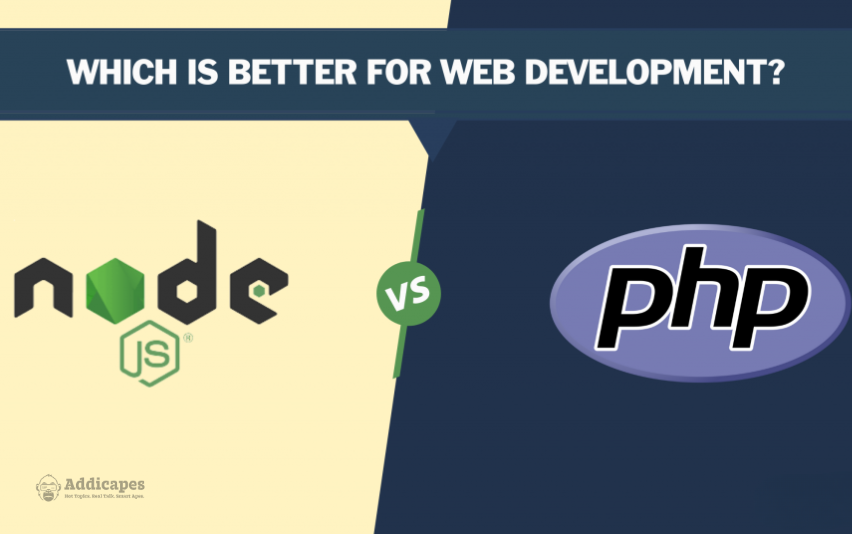When it comes to server-side development, two names dominate discussions: Node.js and PHP. For decades, PHP development has powered millions of websites, from small blogs to platforms like WordPress. On the other hand, Node.js development emerged as a modern solution, allowing developers to use JavaScript on both client and server sides.
So, in 2025, the big question remains: Node.js vs PHP – which technology is better for server-side development? In this article, we’ll break down the strengths, weaknesses, and real-world use cases of both technologies, while optimizing for SEO with keywords like Node.js vs PHP, server-side programming languages, PHP frameworks, Node.js performance, and backend development tools.
What is Node.js?
Node.js is a JavaScript runtime environment built on Google’s V8 engine. It’s not a programming language but an environment that lets you use JavaScript on the server side.
Key Features of Node.js:
- Event-driven & non-blocking I/O → great for real-time apps.
- Scalable performance → handles thousands of concurrent requests.
- Huge ecosystem via npm → millions of packages available.
- Cross-platform development → same language across frontend & backend.
Popular companies using Node.js include Netflix, LinkedIn, Uber, PayPal, and eBay.
What is PHP?
PHP (Hypertext Preprocessor) is one of the oldest and most widely used server-side scripting languages. It powers around 77% of websites today, including WordPress, Facebook (early years), Wikipedia, and Drupal.
Key Features of PHP:
- Easy to learn → beginner-friendly with a shallow learning curve.
- Wide hosting support → almost every hosting provider supports PHP.
- Rich ecosystem → frameworks like Laravel, Symfony, CodeIgniter, and CakePHP.
- Database integration → works seamlessly with MySQL, MariaDB, and PostgreSQL.
Node.js vs PHP: Head-to-Head Comparison
1. Performance
- Node.js performance is superior for real-time apps because of its non-blocking I/O. It handles multiple requests simultaneously without slowing down.
- PHP performance has improved with PHP 8.x, but it still relies on multi-threading, making it less efficient for real-time apps.
Winner: Node.js for real-time and high-performance apps.
2. Scalability
- Node.js scalability is excellent due to microservices architecture and event-driven design.
- PHP scalability works well for small-to-medium apps but struggles when handling massive real-time operations.
Winner: Node.js for large-scale applications.
3. Learning Curve
- Node.js requires developers to understand asynchronous programming, promises, and callbacks, which can be tricky for beginners.
- PHP is extremely beginner-friendly and often the first language new web developers learn.
Winner: PHP for beginners.
4. Frameworks & Ecosystem
- Node.js frameworks: Express.js, NestJS, Meteor, Sails.js – modern and developer-friendly.
- PHP frameworks: Laravel, Symfony, CodeIgniter, CakePHP – powerful and widely used for CMS and eCommerce sites.
Winner: Tie – both have rich ecosystems.
5. Community & Support
- Node.js community is growing rapidly, backed by open-source developers and enterprises.
- PHP community is huge, with decades of documentation, tutorials, and global adoption.
Winner: PHP – simply because it has been around longer.
6. Database Support
- Node.js works seamlessly with NoSQL databases like MongoDB, CouchDB, and also SQL databases.
- PHP integrates perfectly with relational databases like MySQL and PostgreSQL.
Winner: Tie – depends on the project type.
7. Hosting & Deployment
- PHP hosting is cheap and widely available. Almost every hosting service supports PHP by default.
- Node.js hosting requires specialized servers (like AWS, DigitalOcean, Heroku), often making it more expensive.
Winner: PHP for cost-effective hosting.
Pros and Cons
Pros of Node.js
✔ High performance for real-time apps
✔ Unified language (JavaScript)
✔ Scalable and modern architecture
✔ Rich npm ecosystem
Cons of Node.js
✘ Steeper learning curve for async programming
✘ Hosting can be costlier
✘ Not ideal for CPU-heavy operations
Pros of PHP
✔ Beginner-friendly
✔ Affordable hosting
✔ Huge community and documentation
✔ Rich frameworks like Laravel and WordPress ecosystem
Cons of PHP
✘ Slower than Node.js in real-time operations
✘ Outdated reputation among modern developers
✘ Less suited for microservices
Use Cases
Best Use Cases for Node.js
- Real-time chat apps
- Streaming platforms
- Collaboration tools
- Scalable enterprise apps
Best Use Cases for PHP
- Content management systems (CMS)
- eCommerce platforms (Magento, WooCommerce)
- Small-to-medium business websites
- Blogs and forums

Node.js vs PHP in 2025: Which Should You Choose?
The choice depends entirely on your project:
- Choose Node.js development if you’re building real-time applications, SaaS products, or scalable enterprise platforms.
- Choose PHP development if you’re building content-heavy websites, blogs, CMS-powered sites, or small-to-medium business apps with cost-effective hosting.
Conclusion
The Node.js vs PHP debate has no universal winner. Both technologies are powerful, but their strengths cater to different needs. If performance, scalability, and real-time features matter, Node.js is the future. If affordability, CMS support, and ease of learning matter, PHP remains unbeatable.
As businesses scale in 2025, developers should evaluate project requirements, budget, and long-term goals before deciding. The right choice isn’t about which language is “better” — it’s about which one fits your server-side development needs.
❓ FAQs on Node.js vs PHP
1. Which is faster: Node.js or PHP?
Node.js is generally faster because it uses non-blocking, event-driven architecture. PHP 8.x is much faster than older versions, but Node.js still performs better for real-time apps like chat and streaming.
2. Is Node.js better than PHP for web development?
It depends on the project. Node.js is better for real-time, scalable, and enterprise apps. PHP is better for CMS-driven websites, blogs, and cost-effective small business websites.
3. Can Node.js replace PHP in 2025?
No, Node.js cannot fully replace PHP. While Node.js dominates modern SaaS and scalable apps, PHP still powers over 75% of websites worldwide, thanks to WordPress and Laravel.
4. Which has better frameworks: Node.js or PHP?
Both have strong ecosystems.
- Node.js frameworks: Express.js, NestJS, Meteor.
- PHP frameworks: Laravel, Symfony, CodeIgniter.
The choice depends on the project type.
5. Which is cheaper to host: Node.js or PHP?
PHP hosting is cheaper since almost every shared hosting service supports it. Node.js usually requires cloud hosting (AWS, Heroku, DigitalOcean), making it slightly costlier.
6. Should beginners learn PHP or Node.js first?
Beginners should start with PHP because it’s easy to learn, widely documented, and supported everywhere. Node.js requires a deeper understanding of asynchronous programming, which can be challenging for absolute beginners.
7. Which is better for eCommerce: Node.js or PHP?
PHP is better for eCommerce because platforms like Magento, WooCommerce, and OpenCart are PHP-based. Node.js can work for custom eCommerce platforms but requires more development effort.













